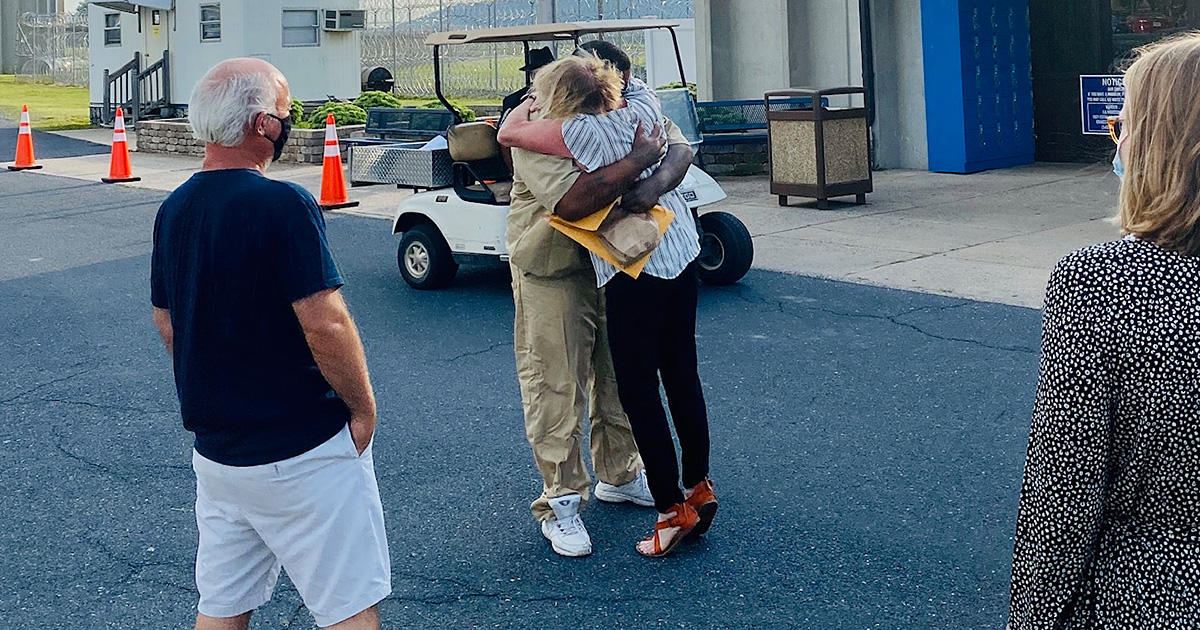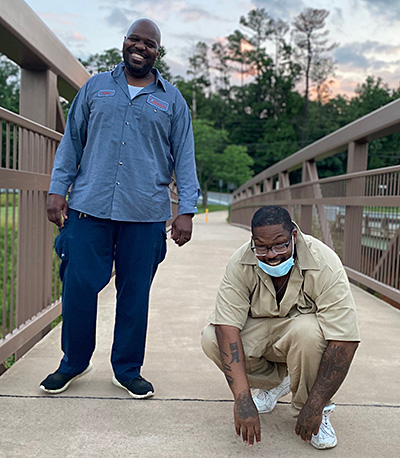Rojai Fentress, a client of the Innocence Project at the University of Virginia School of Law, was released from prison Wednesday evening on a conditional pardon from Gov. Ralph Northam, following years of clinical investigation that strongly suggests he was falsely convicted of murder.
Both the Innocence Project Clinic and the Pro Bono Clinic investigated the case over several years. Clinic directors Deirdre Enright ’92 and Jennifer L. Givens and staff attorney Juliet Hatchett ’15, who oversees the Pro Bono Clinic, met Fentress at the Augusta Correctional Center in Craigsville, Virginia, upon his release.
“Obviously, we are exuberant and relieved to have Rojai free, and we are determined to prove his innocence and have him fully exonerated,” Enright said.
A larger party, which also included students and members of Fentress’ family, celebrated the victory with a socially distanced gathering held in Enright’s yard. A grateful Fentress thanked everyone who worked on his case individually.
 Fentress hugs Professor Deirdre Enright, who supervises the Innocence Project clinic. Photo by Taz Jones ’20
Fentress hugs Professor Deirdre Enright, who supervises the Innocence Project clinic. Photo by Taz Jones ’20
The 40-year-old had been convicted of murder and sentenced to 53 years in prison for a 1996 shooting at Midlothian Village Apartments in South Richmond. He was 15 at the time the drug-deal-gone-bad occurred.
Fentress maintained his innocence, declining multiple offers from prosecutor Brian Wainger to reduce his sentence with plea deals. The lowest offer was for five years; 16-year-old Fentress turned it down. Fentress’ mother testified that he was at home asleep at the time of the late-night incident.
The Innocence Project compiled evidence that strongly supported Fentress’ innocence. Another man confessed to the murder in 2014, providing corroborating details. He has subsequently described the events surrounding the murder multiple times, including as recently as last March.
The Innocence Project’s investigation also revealed that the sole eyewitness at the trial spoke untruthfully under oath about both her intoxication the night of the crime and the fact that she had previously identified someone else as the shooter, Enright and Givens said.
And the investigation discovered new evidence showing that the detective on the case made untruthful statemens at trial and threatened witnesses with charges if they didn’t identify the shooter, the directors said.

Grace Powell ’20, who began working on the Fentress case as a second-year law student in the Innocence Project’s for-credit clinic, recently spearheaded the efforts of law students working in the school’s pro bono clinic on the case.
Powell’s efforts included investigating the reputation of the detective (with the help of classmate Diane Philips), tracking down jurors and preparing the next steps in his legal petition.
“I really can’t say enough about what an incredible experience it was to be a part of,” Powell said. “Rojai called when they brought the papers in for him to sign and walk out of Augusta yesterday. He was just so incredibly happy, and I was on a train to New York sobbing.”
Students in the clinics investigate and litigate wrongful convictions of inmates in Virginia. Some of the cases have forensic evidence (usually DNA) that could be tested, while some, like the Fentress investigation, are non-DNA cases.
The case is an example of the overlap between the for-credit and pro bono clinics. Students who become invested in and knowledgeable about cases in one clinic can sometimes continue working on their cases in the other clinic the next year. The crossover allows the Innocence Project to keep working with committed students and not to lose institutional knowledge each year, the clinic directors said.
Wainger, the prosecuting attorney who is now in private practice, joined in publicly calling upon the state to release Fentress. In addition, a social media campaign acquired about 6,000 signatures in the last week demanding that the man be freed.
Conditional pardons are issued when “there is substantial evidence of extraordinary circumstances to warrant it,” according to the state of Virginia.
“Given that the two clinics were able to undo literally every piece of evidence against Rojai, and another man admitted to being the shooter, we clearly provided ‘substantial evidence of extraordinary circumstances,’” Enright said.
Still, conditional pardons don’t replace the court’s original verdict. Givens said the clinic will continue to pursue a complete exoneration for their client, including filing the petition for a writ of actual innocence on Fentress’ behalf.
Founded in 1819, the University of Virginia School of Law is the second-oldest continuously operating law school in the nation. Consistently ranked among the top law schools, Virginia is a world-renowned training ground for distinguished lawyers and public servants, instilling in them a commitment to leadership, integrity and community service.


